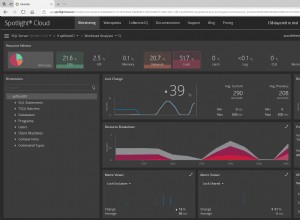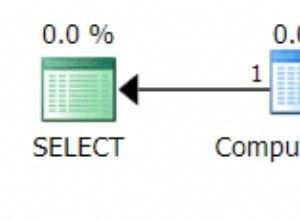presumo, in base alla domanda che hai posto qui ti è piaciuto nei commenti che hai fornito l'intera query (nessun altro campo, che hai eliminato solo per mostrare il codice di esempio)
quindi, se ti servono solo i campi specificati in SELECT istruzione, puoi ottimizzare un po' la tua query:
prima di tutto, ti stai unendo con host_machines solo per collegare cameras e events , ma hanno la stessa chiave host_machines_idhost_machines su entrambi, quindi non è necessario, puoi direttamente:
INNER JOIN events events
ON (events.host_machines_idhost_machines =
cameras.host_machines_idhost_machines))
in secondo luogo, il join con ispy.staff , l'unico campo utilizzato è idreceptionist in WHERE clausola, quel campo esiste in events così possiamo abbandonarlo completamente
la domanda finale qui:
SELECT videos.idvideo, videos.filelocation, events.event_type, events.event_timestamp
FROM videos videos
INNER JOIN cameras cameras
ON videos.cameras_idcameras = cameras.idcameras
INNER JOIN events events
ON events.host_machines_idhost_machines =
cameras.host_machines_idhost_machines
WHERE (events.staff_idreceptionist = 182)
AND (events.event_type IN (23, 24))
AND (events.event_timestamp BETWEEN videos.start_time
AND videos.end_time)
dovrebbe produrre gli stessi record di quello nella tua domanda, senza righe identiche
esisteranno ancora alcuni duplicati video a causa della relazione uno a molti tra le cameras e events
ora, al lato delle cose,
devi definire alcune relazioni sui Video modello
// this is pretty straight forward, `videos`.`cameras_idcameras` links to a
// single camera (one-to-one)
public function getCamera(){
return $this->hasOne(Camera::className(), ['idcameras' => 'cameras_idcameras']);
}
// link the events table using `cameras` as a pivot table (one-to-many)
public function getEvents(){
return $this->hasMany(Event::className(), [
// host machine of event => host machine of camera (from via call)
'host_machines_idhost_machines' => 'host_machines_idhost_machines'
])->via('camera');
}
il VideoController e la stessa funzione di ricerca
public function actionIndex() {
// this will be the query used to create the ActiveDataProvider
$query =Video::find()
->joinWith(['camera', 'events'], true, 'INNER JOIN')
->where(['event_type' => [23, 24], 'staff_idreceptionist' => 182])
->andWhere('event_timestamp BETWEEN videos.start_time AND videos.end_time');
$dataProvider = new ActiveDataProvider([
'query' => $query,
]);
return $this->render('index', [
'dataProvider' => $dataProvider,
]);
}
yii tratterà ogni video come un singolo record (basato su pk), ciò significa che tutti i video duplicati vengono rimossi. avrai video singoli, ciascuno con più eventi, quindi non potrai utilizzare 'event_type' e 'event_timestamp' nella vista ma puoi dichiarare alcuni getter all'interno di Video modello per mostrare tali informazioni:
public function getEventTypes(){
return implode(', ', ArrayHelper::getColumn($this->events, 'event_type'));
}
public function getEventTimestamps(){
return implode(', ', ArrayHelper::getColumn($this->events, 'event_timestamp'));
}
e l'uso della vista:
<?= GridView::widget([
'dataProvider' => $dataProvider,
'columns' => [
['class' => 'yii\grid\SerialColumn'],
'idvideo',
'eventTypes',
'eventTimestamps',
'filelocation',
//['class' => 'yii\grid\ActionColumn'],
],
]); ?>
modifica :
se vuoi mantenere i duplicati del video, dichiara le due colonne da events dentro Video modello
public $event_type, $event_timestamp;
mantieni il GridView originale configurazione e aggiungi un select e indexBy questo alla query all'interno di VideoController :
$q = Video::find()
// spcify fields
->addSelect(['videos.idvideo', 'videos.filelocation', 'events.event_type', 'events.event_timestamp'])
->joinWith(['camera', 'events'], true, 'INNER JOIN')
->where(['event_type' => [23, 24], 'staff_idreceptionist' => 182])
->andWhere('event_timestamp BETWEEN videos.start_time AND videos.end_time')
// force yii to treat each row as distinct
->indexBy(function () {
static $count;
return ($count++);
});
aggiornamento
un diretto staff in relazione a Video è attualmente alquanto problematico poiché è a più di un tavolo di distanza da esso. C'è un problema al riguardo qui
tuttavia, aggiungi lo staff tabella collegandola all'Evento modello,
public function getStaff() {
return $this->hasOne(Staff::className(), ['idreceptionist' => 'staff_idreceptionist']);
}
che ti permetterà di interrogare in questo modo:
->joinWith(['camera', 'events', 'events.staff'], true, 'INNER JOIN')
Filtraggio richiederà alcuni piccoli aggiornamenti sul controller, vista e un SarchModel
ecco un'implementazione minima:
class VideoSearch extends Video
{
public $eventType;
public $eventTimestamp;
public $username;
public function rules() {
return array_merge(parent::rules(), [
[['eventType', 'eventTimestamp', 'username'], 'safe']
]);
}
public function search($params) {
// add/adjust only conditions that ALWAYS apply here:
$q = parent::find()
->joinWith(['camera', 'events', 'events.staff'], true, 'INNER JOIN')
->where([
'event_type' => [23, 24],
// 'staff_idreceptionist' => 182
// im guessing this would be the username we want to filter by
])
->andWhere('event_timestamp BETWEEN videos.start_time AND videos.end_time');
$dataProvider = new ActiveDataProvider(['query' => $q]);
if (!$this->validate())
return $dataProvider;
$this->load($params);
$q->andFilterWhere([
'idvideo' => $this->idvideo,
'events.event_type' => $this->eventType,
'events.event_timestamp' => $this->eventTimestamp,
'staff.username' => $this->username,
]);
return $dataProvider;
}
}
controllore:
public function actionIndex() {
$searchModel = new VideoSearch();
$dataProvider = $searchModel->search(Yii::$app->request->queryParams);
return $this->render('test', [
'searchModel' => $searchModel,
'dataProvider' => $dataProvider,
]);
}
e la vista
use yii\grid\GridView;
use yii\helpers\ArrayHelper;
echo GridView::widget([
'dataProvider' => $dataProvider,
'filterModel' => $searchModel,
'columns' => [
['class' => 'yii\grid\SerialColumn'],
'idvideo',
'filelocation',
[
'attribute' => 'eventType', // from VideoSearch::$eventType (this is the one you filter by)
'value' => 'eventTypes' // from Video::getEventTypes() that i suggested yesterday
// in hindsight, this could have been named better, like Video::formatEventTypes or smth
],
[
'attribute' => 'eventTimestamp',
'value' => 'eventTimestamps'
],
[
'attribute' => 'username',
'value' => function($video){
return implode(', ', ArrayHelper::map($video->events, 'idevent', 'staff.username'));
}
],
//['class' => 'yii\grid\ActionColumn'],
],
]);




